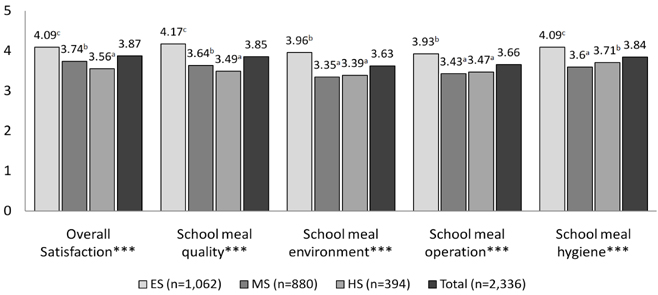Nutr Res Pract.
2018 Aug;12(4):342-347. 10.4162/nrp.2018.12.4.342.
Effects of students' satisfaction with school meal programs on school happiness in South Korea
- Affiliations
-
- 1Department of Food and Nutrition, Shingu University, Seongnam, Gyeonggi 13174, Korea.
- 2Department of Food and Nutrition, Jangan University, Hwaseong, Gyeonggi 18331, Korea.
- 3Department of Food and Nutrition, Myongji University, 116 Myongji-ro, Cheoin-gu, Yongin, Gyeonggi 17058, Korea. zeromi@mju.ac.kr
- KMID: 2421000
- DOI: http://doi.org/10.4162/nrp.2018.12.4.342
Abstract
- BACKGROUND/OBJECTIVES
School meals are not just meals consumed at school, they are part of the culture, education, and life experience at school. Nevertheless, few studies have revealed the influence of school meals on students' school lives. The purpose of this study was to investigate the effect of satisfaction with the school meal program on students' school happiness.
SUBJECTS/METHODS
A survey conducted in December 2015 asked 2,336 students (1,062 elementary school students, 880 middle school students, and 394 high school students) about their satisfaction with the school meal program and their school happiness. Multiple regression analyses were used to examine the relation between the students' school meal satisfaction and their happiness level.
RESULTS
The average level of satisfaction with school meals of elementary school students was 4.1 out of 5 points, comparatively higher than that of middle and high school students, with a significant difference between school levels (P < 0.001). In addition, school happiness, as well as overall happiness, of elementary school students was higher than that of middle and high school students (P < 0.001). The school meal operation factor (0.232, P < 0.001) had the most influence on students' school happiness, followed by the school meal environment factor (0.219, P < 0.001) and school meal quality factor (0.136, P < 0.001). Overall satisfaction (0.097, P = 0.001) and school meal hygiene factor (0.095, P = 0.001) also had significant influences on students' school happiness.
CONCLUSIONS
Students' satisfaction with the school meal program was related to their school happiness. Therefore, plans to enhance students' satisfaction with a school meal program needs to be implemented, with emphasis on placing a priority on school meal operation and school environment factors, in order to improve students' level of happiness.
Keyword
Figure
Reference
-
1. Ministry of Education and Human Resources Development (KR). School Health (School Foodservice) in 50 Years. Seoul: Ministry of Education;2001.2. Ministry of Education (KR). Article 1 of Enforcement Decree of the School Meals Act: Purpose (2013).3. Ministry of Education (KR). The 2015 status of school foodservice [Internet]. Sejong: Ministry of Education;2016. cited 2018 January 30. Available from: http://www.index.go.kr.4. Thomas D. Quality of vegetarian cafeteria services and students' overall satisfaction with their university. Int Forum. 2015; 18:81–96.5. Yanqiu D, Mingzhi H, Sha L, Yuan L, Haiyang N, Yifan W. Food services and student life: a business anthropological case study. J High Educ Theory Pract. 2012; 12:17–38.6. Tian R, Trotter D, Zhang L, Shao H. The importance of foodservice in higher education: a business anthropological case study in China. Anthropologist. 2014; 18:65–69.
Article7. Ministry of Education (KR). Comprehensive Plan to Improve School Meals Report, 2015. Seoul: Ministry of Education;2015.8. Binge C, Xufen H, Guoying L, Chunyue W, Tingting Y. Impacts of campus foodservice on students' life: an anthropological case study of Shantou University. Int J Chin Mark. 2012; 2:123–143.9. Organisation for Economic Co-operation and Development (OECD). PISA 2012 results in focus [Internet]. [place unknown]: Organisation for Economic Co-operation and Development;2013. cited 2018 January 30. Available from: http://www.oecd.org/pisa/keyfindings/pisa-2012-results-overview.pdf.10. Bang Jeong-Hwan Foundation. Institute for Social Development Studies of Yonsei University. 2015 Korea Child and Youth Happiness Index. Seoul: Bang Jeong-Hwan Foundation;2016.11. Liang X, Zhang S. Investigation of customer satisfaction in student food service: an example of student cafeteria in NHH. Int J Qual Serv Sci. 2009; 1:113–124.12. Jeong E, Chun Y, Joo N, Yoon JY. Comparison of students' foodservice satisfaction between Korea and US. Nutr Res Pract. 2013; 7:66–71.
Article13. Yang IS, Yi BS, Park MK, Baek SH, Chung YS, Jeong JY, Kim YJ, Kim HY. Evaluation of the quality attribute and satisfaction on school foodservice in 2010. Korean J Community Nutr. 2013; 18:491–504.
Article14. Park SH, Choe YC. Students' satisfaction of school lunch according to the dietary habit and educational experience of nutrition and food. Fam Environ Res. 2015; 53:425–432.
Article15. Gyeonggido Office of Education. Well-being Index for Students Report. Suwon: Gyeonggido Office of Education;2015.16. Yang IS. Students' Satisfaction of School Lunch Program in 2014. Seoul: Ministry of Education;2015.17. Jeju District Office of Education. Satisfaction with Student Happiness and Basic Psychological Needs Teacher's Happiness and Job Stress. Jeju: Jeju District Office of Education;2015.18. Mo SH, Lee JS. A exploration on variables influencing subjective happiness of youth: moderating effects of family factors on academic stress. J Holist Converg Educ. 2012; 16:23–40.19. Kwon SW, Lee AH, Song IH. A study on adolescent happiness: application of the adolescent resilience model. Stud Korean Youth. 2012; 23:39–72.20. Park SY, Lee HJ. Determinants of subjective well-being among Korean adolescents. Korean J Stress Res. 2013; 21:73–84.21. Kim DH. The relationship between optimism and learning motivation for elementary school students [master's thesis]. Seoul: Seoul National University of Education;2006.22. Gyeonggido Office of Education. Operation Status of Elementary Care Class in Gyeonggi-do. Suwon: Gyeonggido Office of Education;2017.
- Full Text Links
- Actions
-
Cited
- CITED
-
- Close
- Share
- Similar articles
-
- Perception and Satisfaction of the Free School Meal Program for High School Students in Busan
- Factors Influencing Happiness Index of Nursing Students
- Effects of Academic Resilience and Interpersonal Competence on the Happiness of Nursing Students
- Factors Influencing Subjective Happiness in Korean Nursing Students
- Factors related to Happiness in First year Women Nursing Students


